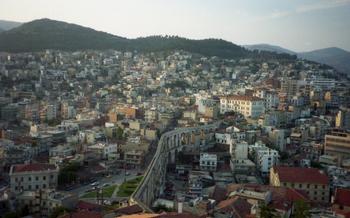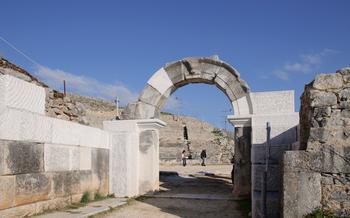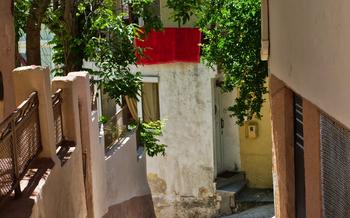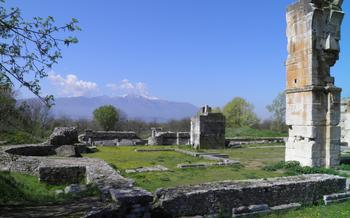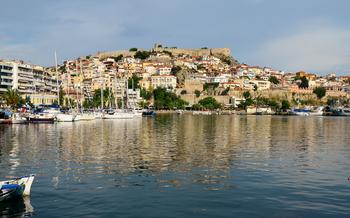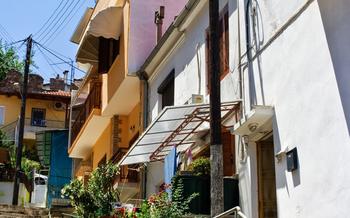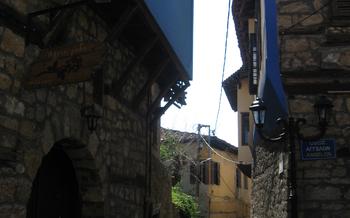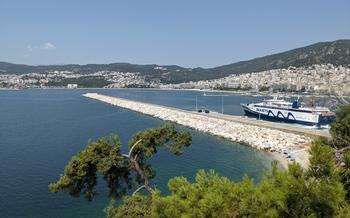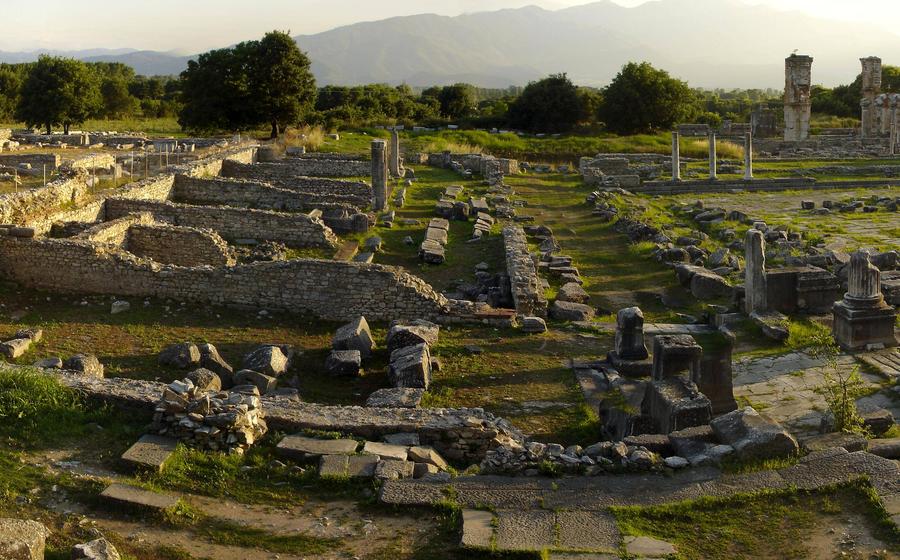
Philippi Archaeological Site
- Archaeological Highlights
- Religious Significance:
- Museum Visit
- Walking Tours
- Festivals and Events
- Gastronomic Delights:
- Shopping
- Accommodations
- Transportation:
- Best Time to Visit
- Practical Tips
- Accessibility
- Insider Tip
Archaeological Highlights
Marvel at the impressive ruins of the ancient city of Philippi, a testament to its rich history and cultural significance. Explore the well-preserved Agora, once the bustling marketplace and center of public life. Ascend to the Acropolis, the fortified upper city, and admire the remains of temples, fortifications, and other structures that offer stunning views of the surrounding countryside. Step into the Roman Forum, the administrative and judicial heart of the city, and marvel at the remnants of public buildings, shops, and a basilica.
Explore the ancient theater, a magnificent venue for performances and public gatherings, where you can almost hear the echoes of ancient voices. Discover the impressive ruins of the Octagon, a unique octagonal building adorned with intricate mosaics, believed to have been a baptistery or a mausoleum. The city walls, gates, and towers, with their imposing presence, provide a glimpse into Philippi's defensive prowess and strategic importance throughout history.
Religious Significance:
Discover the profound religious significance of Philippi, one of the earliest centers of Christianity in Europe. Immerse yourself in the footsteps of the apostle Paul, whose missionary work in the city left an indelible mark on the region's spiritual landscape. Visit the ruins of the Basilica of Saint Paul, a testament to the early Christian community that flourished here. Explore the Lydia Baptismal Site, where, according to tradition, Lydia, the first European convert to Christianity, was baptized. Immerse yourself in the spiritual atmosphere of Philippi, a city that continues to attract pilgrims from around the world, seeking inspiration and connection with its rich religious heritage.
Museum Visit
To delve deeper into the history and culture of Philippi, a visit to the Philippi Archaeological Museum is a must. The museum houses an impressive collection of artifacts excavated from the archaeological site, including sculptures, pottery, coins, and inscriptions. These artifacts provide valuable insights into the daily lives of Philippi's inhabitants, from their religious practices to their economic activities. Through interactive exhibits and multimedia presentations, the museum brings the city's past to life, allowing visitors to experience the grandeur of ancient Philippi. Guided tours are available to enhance the museum experience, with knowledgeable experts providing captivating insights into the significance of the artifacts and the site itself.
Walking Tours
Embark on a guided walking tour to discover the highlights of Philippi's archaeological site. Follow in the footsteps of ancient Macedonians, Romans, and early Christians as you explore the city's main attractions. Listen to captivating stories and anecdotes about Philippi's rich history and cultural heritage. Enjoy the scenic views of the surrounding countryside from the Acropolis.
Philippi's archaeological site is best explored on foot, as it allows you to get up close and personal with the ruins and immerse yourself in the atmosphere of this ancient city. Guided walking tours are an excellent way to learn more about Philippi's history and culture. Knowledgeable guides will lead you through the site, pointing out the most significant landmarks and sharing stories about the people who lived here.
Be sure to wear comfortable shoes, as the tour will involve a fair amount of walking on uneven surfaces. The terrain can be challenging in places, but the rewards are worth it. From the Acropolis, you'll be treated to stunning views of the surrounding countryside, including the Aegean Sea and Mount Pangaion.
Walking tours of Philippi typically last for around two hours. They are available in various languages, so you're sure to find one that suits you. Prices vary depending on the tour operator, but they typically start at around €10 per person.
Whether you're a history buff, an architecture enthusiast, or simply someone who enjoys exploring new places, a guided walking tour of Philippi is a must-do activity. It's a great way to learn more about this fascinating ancient city and see its ruins come to life.
Festivals and Events
Experience the vibrant cultural scene of Philippi by attending one of its many festivals and events. Immerse yourself in the excitement of the Philippi Festival, held annually in July, which features traditional music, dance, and theater performances. Celebrate the city's patron saint, Saint Paul, during the annual feast day celebrations in June, which include processions, religious ceremonies, and cultural events. Participate in workshops, lectures, and exhibitions that showcase Philippi's rich history and traditions. These events provide a unique opportunity to delve deeper into the city's cultural heritage and connect with the local community.
Gastronomic Delights:
Indulge in the culinary delights of Philippi, which blend traditional Greek flavors with influences from various cultures. Sample local specialties such as kavala, a traditional dish made with smoked codfish, potatoes, and vegetables. Enjoy fresh seafood dishes, prepared with the day's catch from the nearby Aegean Sea. Savor the region's renowned olive oil, produced from centuries-old olive groves surrounding Philippi. Immerse yourself in the vibrant flavors and aromas of Philippi's cuisine, which is sure to tantalize your taste buds and leave you wanting more.
Shopping
Embark on a shopping expedition in Philippi to discover unique souvenirs and local products that capture the essence of this historic city. Delve into the charming shops and boutiques that line the streets, each offering a treasure trove of handmade crafts, pottery, and jewelry inspired by Philippi's rich history and cultural heritage. Indulge in local delicacies such as honey, cheese, and traditional sweets, perfect for taking home as gifts or savoring as a sweet treat. Immerse yourself in the vibrant atmosphere of the weekly market, where you can haggle for fresh produce, traditional products, and handmade goods while supporting local artisans and businesses. Let the spirit of Philippi guide your shopping adventure as you unearth treasures that will serve as lasting mementos of your journey.
Accommodations
Philippi offers a range of accommodation options to suit every traveler's needs and budget. From traditional guesthouses with warm hospitality to modern hotels with contemporary amenities, you'll find a place to rest and recharge after a day of exploring the ancient city.
For an authentic Greek experience, consider staying in a traditional guesthouse in the heart of the city. These charming accommodations often feature stone-built architecture, cozy rooms with local touches, and friendly hosts who are eager to share their knowledge of Philippi's history and culture.
If you prefer modern comforts, opt for one of the city's hotels. These establishments offer a range of amenities, including comfortable rooms, air conditioning, and Wi-Fi access. Some hotels even boast stunning views of the Aegean Sea or the surrounding mountains.
For a truly unique experience, consider staying in a traditional Greek village nearby. These villages offer a glimpse into the local way of life, with charming stone houses, narrow cobblestone streets, and friendly tavernas serving delicious Greek cuisine.
No matter where you choose to stay, Philippi's accommodations offer a comfortable and convenient base for exploring this ancient city and its surroundings.
Transportation:
Philippi is conveniently accessible by car, bus, or train from major cities in Greece, such as Thessaloniki and Athens. Once in Philippi, the best way to explore the city is on foot or by renting a bicycle, allowing you to navigate the narrow streets and archaeological site at your own pace. Organized tours are also available, providing transportation and guided visits to Philippi and other nearby attractions, such as the beautiful beaches of Thassos and the ancient city of Kavala. To avoid any inconvenience, especially during peak tourist season, it is advisable to plan your transportation in advance, ensuring a smooth and enjoyable journey to this historical gem.
Best Time to Visit
The best time to visit Philippi is during the shoulder seasons (April-May and September-October) when the weather is pleasant and the crowds are smaller. This allows you to explore the archaeological site and the city's other attractions without the hustle and bustle of peak tourist season.
If you're interested in experiencing the city's vibrant cultural scene, plan your visit to coincide with the annual Philippi Festival in July. This festival showcases the city's rich history and heritage through traditional music, dance, theater performances, and other cultural events.
For a more tranquil experience, consider visiting Philippi during the off-season (November-March) when the weather is mild, and the crowds are minimal. This is an excellent time to explore the city's archaeological site and museums at your own pace and enjoy the peaceful atmosphere.
No matter when you choose to visit, be sure to check the weather forecast before your trip to be prepared for any weather conditions.
Practical Tips
-
Comfortable Shoes: Philippi's streets and archaeological site feature uneven surfaces and cobblestones. To ensure a comfortable visit, wear sturdy and supportive footwear with good traction.
-
Sun Protection: Greece is known for its sunny weather, so come prepared with sunscreen, a hat, and sunglasses. The Mediterranean sun can be intense, especially during the summer months.
-
Hydration: Stay hydrated by bringing a water bottle with you. There are limited water sources within the archaeological site, so it's essential to come prepared.
-
Wi-Fi: Take advantage of the free Wi-Fi hotspots available in some areas of Philippi to stay connected and access information about the city and its attractions.
-
Language: Learning a few basic Greek phrases can enhance your travel experience. It shows respect for the local culture and can help you communicate with locals.
Accessibility
Philippi is generally accessible for visitors with disabilities, with ramps and designated parking spaces available. However, some areas of the archaeological site may be challenging to navigate due to uneven terrain and cobblestone paths. Visitors with mobility impairments are advised to plan their visit in advance and consider using a wheelchair or mobility scooter. Guided tours with accessible features, such as audio descriptions and sign language interpretation, may be available upon request.
Insider Tip
For an immersive and enriching experience, visit the Philippi Archaeological Museum before exploring the archaeological site. The museum houses a wealth of artifacts, including sculptures, pottery, coins, and inscriptions, that provide valuable insights into the city's history and culture. Take advantage of the guided tours offered by the museum to learn more about the significance of these artifacts and the site itself. Ask the museum staff for recommendations on specific areas of the archaeological site that are worth exploring based on your interests. Plan to spend at least half a day exploring the archaeological site to fully appreciate its richness and historical importance.
